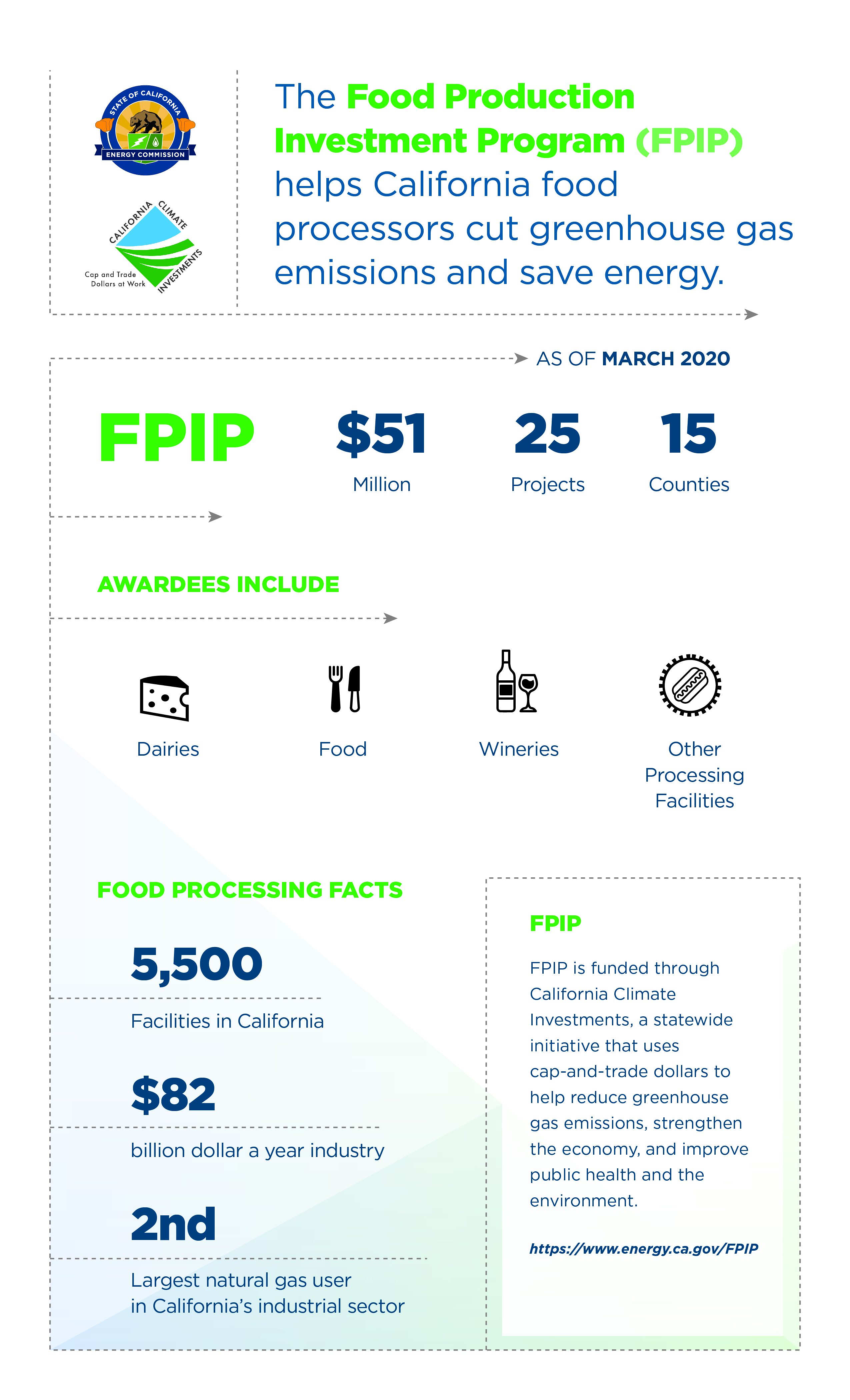For Immediate Release: March 11, 2020
Another $5 Million Awarded for Research Project in Richmond to Help Disadvantaged Communities
SACRAMENTO – The California Energy Commission (CEC) approved $19.4 million in grants today to help food producers reduce energy use and cut greenhouse gas (GHG) emissions associated with food production.
The projects are funded through the Food Production Investment Program (FPIP), which is part of California Climate Investments, a statewide initiative that uses cap-and-trade dollars to help reduce GHG emissions, strengthen the economy and improve public health and the environment.
Since FPIP was established in 2018, the CEC has awarded more than $51 million for 25 projects in 15 counties across the state, including today’s awards.
“This program provides essential support to California food producers who are seeking to reduce costs and be part of the climate solution by adopting innovative projects that save energy and shrink their carbon footprints,” said Vice Chair Janea A. Scott.
Today’s recipients are:
- Amy’s Kitchen, Sonoma County, $4.4 million to install a high-efficiency refrigeration system at its food production facility in Santa Rosa
- Bimbo Bakeries, several locations in California, $1.1 million to install waste heat recovery systems, high-efficiency motors and replacement boilers
- Hilmar Cheese, Merced County, $1.7 million to upgrades refrigeration, boiler and compressed air systems at its cheese processing facility in Hilmar
- Pacific Coast Producers, Yolo County, $1.7 million to install a high-efficiency high-pressure boiler and $1.1 million to install high-efficiency hot breaks at its tomato production facility in Woodland
- OWB Packers, Imperial County, $2.3 million to install energy-efficient compressed air, refrigeration and hot water systems at its meat processing facility in Brawley
- Sun-Maid Growers of California, Fresno County, $5.3 million to install a fully electric raisin dryer at its production facility in Kingsburg
- Sunsweet Growers, Sutter County, $1.6 million to install high-efficiency air compressors, boilers and boiler equipment
Food processing plants account for more than 3 million metric tons of carbon dioxide equivalent (CO2e) of annual GHG emissions in California, according to the California Air Resources Board.
FPIP-funded projects could reduce GHG emissions by up to 50 percent annually at the various host facilities.
Richmond Advanced Energy Community Project
The CEC also awarded a $5 million Electric Program Investment Charge (EPIC) program grant to Zero Net Energy Alliance to implement phase two of the Richmond Advanced Energy Community project.
The EPIC program invests in scientific and technological research to accelerate the transformation of the electricity sector to meet the state’s clean energy and climate goals.
Phase one of the project began in 2016 when Zero Net Energy Alliance received a $1.5 million EPIC grant to identify challenges disadvantaged communities face in advancing GHG emission reduction goals such as lack of financing options, lack of information and outreach, and an absence of policies to leverage cost advantages of zero-net energy construction.
Zero Net Energy Alliance worked with the City of Richmond, community residents and other stakeholders to outline technical, policy, and financial solutions to improve energy resiliency, increase electric vehicle adoption, advance zero-net-energy building codes, turn abandoned homes into highly efficient residences, and to promote distributed energy resources. Phase one was completed in 2018.
During phase two, which runs through 2025, the money will be used to build out and demonstrate projects identified in the first phase.
Details on other actions taken today are in the business meeting agenda.
###
About the California Energy Commission
The California Energy Commission is leading the state to a 100 percent clean energy future. It has seven core responsibilities: developing renewable energy, transforming transportation, increasing energy efficiency, investing in energy innovation, advancing state energy policy, certifying thermal power plants, and preparing for energy emergencies.

Newsroom
Media Contact
Michael Ward
MediaOffice@energy.ca.gov
(916) 654-4989
